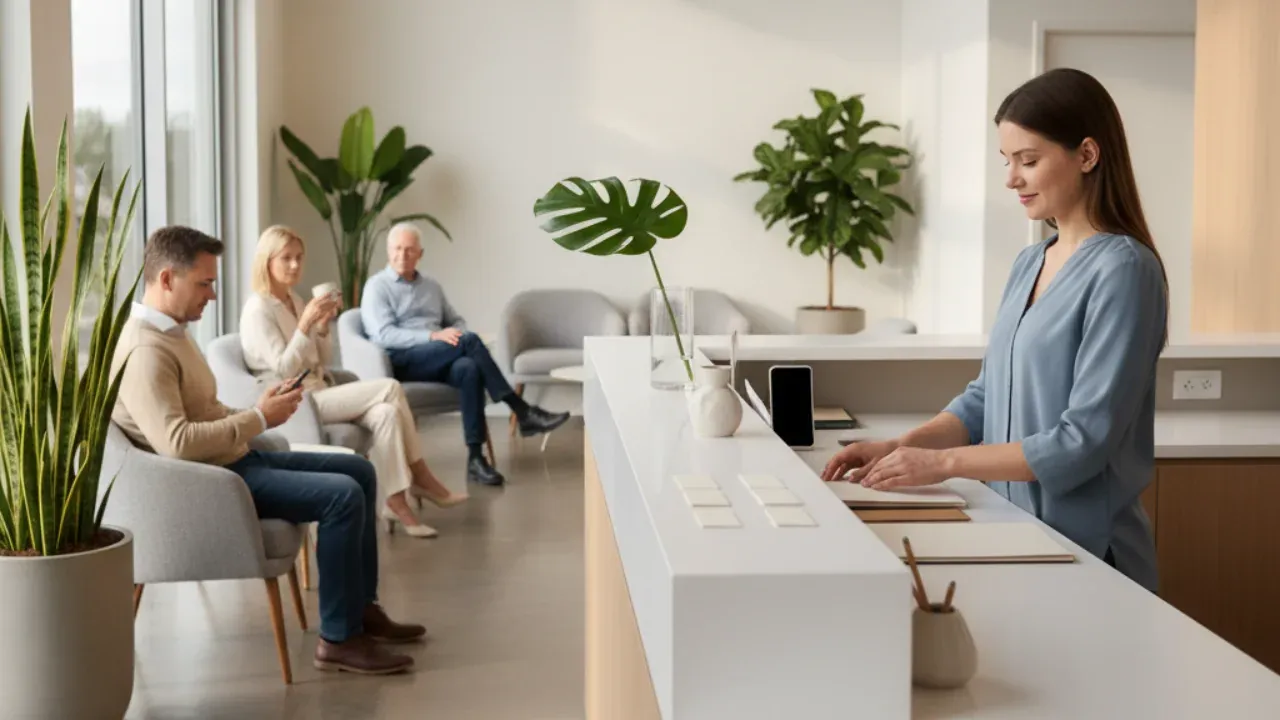
Humanizing interactions in clinics and medical practices is no longer a differentiator—it’s what today’s patients expect. In a highly competitive landscape where information is only a few clicks away, the way your care team communicates directly influences satisfaction, loyalty, and word-of-mouth referrals. In this context, using human-centered phrases becomes a core strategy to create genuine connections and strengthen your clinic’s brand.
More than courtesy, humanized language reflects empathy, active listening, and respect for each person’s needs. When done well, it eases tension, improves the patient experience, and fosters a welcoming, professional environment. In this article, we’ll cover human-centered phrases your clinic can use.
Before we continue, we need to ask: Are you already familiar with Ninsaúde Clinic? Ninsaúde Clinic is an intelligent software designed to simplify clinical management — combining an agile schedule, legally valid electronic health records, telemedicine, and complete financial control in one platform. Discover how Ninsaúde Clinic transforms daily operations and enhances patient care.

Why Invest in Humanized Care in Healthcare
Humanized care goes beyond good manners. It’s a mindset that values the patient as a human being—with emotions, fears, questions, and expectations. In daily clinic operations, this approach directly impacts three essential pillars:
- Patient experience: a welcomed patient is more likely to collaborate with treatment and follow clinical guidance.
- Clinic reputation: the patient encounter is your primary touchpoint and strongly shapes your organization’s reputation.
- Clinical and financial results: satisfied patients miss fewer appointments, return more often, and recommend your services.
To put humanization into practice, it’s essential to train your team and adopt tools that enable clear, empathetic, and personalized communication. Software such as Ninsaúde Clinic lets you create automated messages with customizable language focused on the patient experience.

Principles of Human-Centered Communication
Before exploring the phrases, it helps to understand the pillars that sustain more humanized communication:
- Empathy: put yourself in the other person’s shoes.
- Clarity: convey information without ambiguity.
- Personalization: adapt the message to each patient’s reality.
- Active listening: show genuine interest in what the other person says.
- Kindness: use a warm tone—even in challenging situations.
These elements can be incorporated from the very first interaction, whether by phone, text message (SMS or WhatsApp), email, or in person.
Welcome Phrases at the Front Desk
First impressions often shape the entire experience. Your front desk should be a place of empathy and welcome.
Examples:
- “Good morning! How can I help you today?”
- “Welcome! Please make yourself comfortable—we’ll be right with you.”
- “We know appointments can make you feel anxious. We’re here to support you however you need.”
- “Would you like some water or a moment to get settled? Take your time.”
Using these phrases helps reduce initial nervousness and shows patients they’re valued from the first contact.
Phrases for Appointment Confirmations
Confirmation messages sent by text (SMS or WhatsApp) can also be humanized and aligned with your clinic’s voice.
Humanized templates:
- “Hi, [Patient first name]! Just a friendly reminder of your appointment with [Provider] on [date] at [time]. If anything comes up, please let us know—we’re here for you.”
- “All set for your appointment? We’re looking forward to seeing you! If you need to reschedule, just tell us.”
Software like Ninsaúde Clinic lets you customize these messages and schedule automated sends based on each provider’s calendar.
Phrases During the Visit
During the consultation or procedure, communication should reinforce patient safety and your commitment to their well-being.
Practical examples:
- “We’ll go at a comfortable pace. If you feel any discomfort, please tell me.”
- “If you have any questions about what we’re doing, feel free to ask.”
- “Your input is really important—it helps us take better care of you.”
- “We’re here to listen. Please share whatever you need.”
Keep the language simple, direct, and adapted to the patient’s age and emotional state.

Phrases for Post-Visit Instructions
Care doesn’t end when the patient leaves the room. Reinforcing at-home guidance and making support available are essential.
Suggested phrases:
- “Please follow the instructions we reviewed. If any questions come up, reach out to us.”
- “It was a pleasure seeing you today. Take good care—and remember, we’re here whenever you need us.”
- “We’ll check in with you soon to see how you’re doing. We’re here for you.”
With CRM tools like those in Ninsaúde Clinic, you can automate these follow-ups and maintain a close relationship with patients.
Phrases for Rescheduling and Cancellations
Even when a patient needs to cancel or reschedule, you can maintain empathy and respect.
Sample approaches:
- “No problem at all! We understand things happen. When you’re ready to reschedule, we’re here to help.”
- “Thanks for letting us know. That helps us organize our schedule so we can serve you better.”
Responding with understanding preserves the relationship and helps prevent future drop-offs.
Phrases for Feedback and Satisfaction Surveys
Gathering feedback is part of humanized care. How you ask for it influences participation.
Effective models:
- “Your feedback really helps us improve. Would you tell us how your experience was today?”
- “We’re always looking to get better. Your suggestion could help a lot—would you share it with us?”
Platforms like NPS or surveys integrated into Ninsaúde Clinic help measure satisfaction and generate improvement plans.
Phrases for Loyalty and Ongoing Relationships
Maintaining contact after the visit is strategic for loyalty and spontaneous returns.
Recommended phrases:
- “We’ve missed you around here! How about booking your follow-up?”
- “It’s been a while since your last visit—can we help you schedule a new appointment?”
- “We have some updates that might interest you. Want to hear more?”
Using a CRM lets you run segmented, personalized campaigns based on each patient’s history.
How to Train Your Team for a More Human-Centered Approach
Beyond phrases, your entire team should understand the importance of humanization and adopt consistent behavior in every interaction.
Recommendations to implement a human-centered culture:
- Hold regular trainings with practical examples and role-plays.
- Encourage teammates to share experiences.
- Use visual aids with model phrases in key clinic areas.
- Provide ongoing feedback on communication and demeanor.
- Create review rituals based on compliments and complaints.
Managers can also use reports and satisfaction surveys—like those available in Ninsaúde Clinic—to monitor service quality and drive continuous improvement.

Humanized Phrases Make a Real Difference in Care
Adopting human-centered phrases doesn’t mean reading a script. It means building communication that’s more empathetic, clear, and effective. In healthcare, every word can comfort, guide, and strengthen the bond between patients and the care team.
By investing in language that welcomes and respects, your clinic positions itself as a place of whole-person care, where the patient experience is a priority. And with tools like Ninsaúde Clinic, you can amplify that journey with technology, efficiency, and humanization.
Liked the information? Then prepare for a continuous journey of knowledge by following our blog. Are you a health professional and not yet familiar with the benefits of Ninsaúde Clinic? Stay ahead, optimize your processes, and elevate excellence in patient care!

